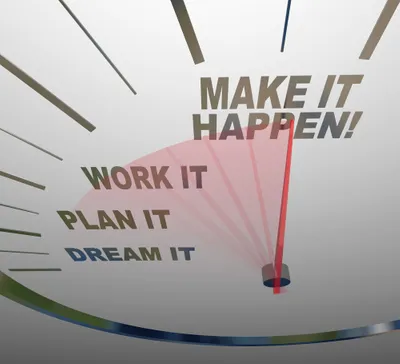We are filled with the best intentions. We would love to be productive—whether that means losing weight, living healthy or meeting deadlines, but it can be hard to convince ourselves to make the necessary sacrifices. We get frustrated, kicking ourselves for not fitting in that run or for being late with those papers. The truth is, we can’t always rely on will power to propel us into productivity.
Here are six ways to trick ourselves into the productive lifestyle we all picture…
1. Rise and Shine
Put your alarm clock in your bathroom. That way when it goes off, you’ll be forced to either roll out of the covers and into the bathroom or to be driven insane by its incessant whaling. It’s unrealistic to expect that you won’t reach for that snooze button at least once. Take away the temptation that comes with having your alarm clock an arm’s length away.
Steve Pavlina is the American self-help author of Personal Development for Smart People. He refers to the state we wake up in as a “brain fog”. According to Pavlina, it’s completely unrealistic to rely on your self will and decision making to get out of bed when you’re in that fog. Something needs to force you wake up, and distancing your alarm clock will do so. Once you’re up, you’ll be more likely to stay up, or to at least think twice before retiring back to bed.
2. Change the Clocks
Time is all about perception. Set your clocks back a couple minutes. When you’re running 5-minutes late, you’ll realize that means you’re actually on time. When you have a deadline, immediately change it in your personal calendar. Make it 2 or 3-days earlier than it needs to be, and stick with that. This way, the procrastination that plagues you has less power over your life.
In a 2007 meta-analysis by University of Calgary psychologist, Piers Steel, PhD, reported that, “Eighty-percent to 95-percent of college students procrastinate, particularly when it comes to doing their coursework.” Old habits are hard to break, and you may still be up until midnight the day before your newly assigned deadline. But at least you still have 3-days to correct the errors that come from the fog of a late night. The real deadline will be much less stressful, and finishing early will give you a heightened sense of accomplishment that may just break your procrastination habits for good.
3. Sunday Prep Time
Do you really expect yourself to eat right through your crazy week? You think you’ll have time to pack a good lunch when you’re leaving at the crack of dawn? Suddenly that Tim Hortons drive thru seems tempting when you’re hungry between meetings. A study conducted by QSR Magazine reveals that the average wait time at a drive thru is almost exactly 3-minutes. That’s sounds pretty good compared to slaving over a stove when you already feel like there aren’t enough hours in the day.
Take away the pressure and set yourself up for success on Sunday afternoon. Put some music on, clear the counters, and prepare some meals for the week. Cook up a bunch of chicken breasts, make a big salad that will last—whatever works with your idea of healthy eating. Label plastic containers for different days of the week, and just grab them from the fridge on your way out.
4. Sweat Before the Sun Comes Up
Work out before your brain wakes up. It’s so easy to have your lunch time workout plans changed by a demanding schedule, or to lose the determination by the time 5-o’clock rolls around. Get your workout over with before you can dread it, and then forget about it for the rest of the day. A recent study by Appalachian State University found that morning workouts ensures a better night’s sleep!
But, don’t try this one on your own. Join a running group that runs in the mornings, establish yourself as a regular at an early morning class, or if you have a trainer, make the appointments early. Make your workout social and get it over with early. That way you can stop stressing about it all day.
5. Respond in Chunks
Although email is a tool to improve communication, it can really inhibit productivity. Catherine Clifford, author with Entrepreneur Magazine, says enterprise workers spend 15-percent of their work time on emails, and its 43-percent of the reason they’re not getting things done. It is actually possible to take your email accounts offline. Fiddle with your settings, and keep the emails from popping up all day long. When you’re ready to check, take your accounts online and they will all come through at once.
Tim Ferris, author of The Four Hour Work Week and master time manager, encourages people to check their email twice a day. Ferris suggests sending a notice to the people you work with, telling them when they can expect responses, and to keep these times consistent. This might be too radical to fit your business style, but the premise stands. You will get more done by checking your email in bunches rather than being distracted by incoming traffic all day.
6. Apply the 40/20 Rule
We all have tasks that drag us down. Homework, paperwork, taxes, or something else that drains us. Oftentimes, the perceived enormity of these tasks prevents us from even starting in the first place. Use time to trick yourself into getting them done. Alejandro Lleras, psychology professor at the University of Illinois, says there is value in deactivating and reactivating your goals. He recommends, “Brief mental breaks [to] actually help you stay focused on your task.”
Promise to only work on the dreaded task for 40-minutes, and then know the remaining 20-minutes of the hour are yours for well-deserved relaxation. Actually set a timer. 40-minutes of grinding work rewarded with a 20-minute T.V. show. This may seem like a waste of time, but you’re more likely to continue the 40/20 cycle than to get through it all at once, and you’re much more likely to start a task knowing it will only last for 40-minutes.
7. Alert the Media
Tell people about your goals. People have an innate fear of looking foolish, of public failure. A study done by the Dominican University of California found that people who keep their goals to themselves will succeed less than 50-percent of the time, but those who share have a 75-percent chance of success. It’s easy to say we’ll get ‘em next time in our minds, but if everyone knows what you’re after, you’re more likely to get it done.
Our desire to please others may be slightly excessive, but use it to your advantage. Write your goal down where people can see it, tell a few close friends—via Facebook or Twitter. Or track your success with a tool, like stickk.com. You may not know who’s following your success behind their screen, but you still don’t want to disappoint. Take advantage of your pride, let it drive you forward.










